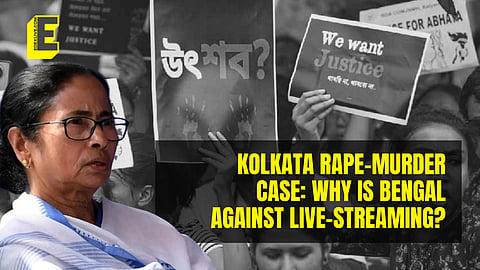

The West Bengal administration's reluctance to permit live-streaming — whether during Supreme Court proceedings or in meetings with protesting junior doctors regarding the RG Kar rape-murder case — has drawn considerable scrutiny.
In the Supreme Court
During the Supreme Court hearing on September 17, Senior Advocate Kapil Sibal, representing the state government, opposed live-streaming, arguing that the case carries "huge emotive implications".
The senior advocate also revealed that female lawyers in his chamber had received threats of rape and acid attacks for representing the State of West Bengal in this sensitive matter.
However, Chief Justice of India (CJI) DY Chandrachud rejected Sibal’s request, stating that while the court would intervene in cases of threats against female lawyers, live streaming would proceed as it is a matter of public interest and falls within the scope of an open court.
During discussions about meeting
In a parallel situation, the West Bengal government steadfastly refused to allow a live telecast of its meeting with the protesting doctors, despite their repeated requests. The doctors had previously declined to meet with the government on four occasions unless live-streaming or videography was permitted.
Nonetheless, the state administration maintained its position, citing that the "matter is sub judice".
After several days of demanding transparency, the doctors ultimately agreed to meet with Chief Minister Mamata Banerjee without live-streaming, on the condition that minutes of the meeting would be recorded and signed by both parties.
“We are eager to resolve this issue and return to work, which is why we decided to meet the CM without live-streaming. She stated that it couldn’t be allowed because the matter is still in court. We simply want transparent and fair proceedings — whether in court or at the state secretariat. We have nothing to hide,” said one protesting doctor, on the condition of anonymity.
This hesitation from the West Bengal government raises further concerns, especially in light of recent developments in the RG Kar case, including the arrests of former RG Kar Principal Dr Sandip Ghosh and the Officer-in-Charge of Tala Police Station, Abhijit Mondal.
Additionally, in response to the junior doctors' demands, the state administration has transferred several high-ranking officials, including Commissioner of Police Vineeth Kumar Goyal, the Director of Medical Education (DME), and the Director of Health Sciences (DHS).
From the beginning, the protesting doctors have accused officials from RG Kar Medical College and the state administration of involvement in the case, underscoring the urgent need for transparency and accountability.
